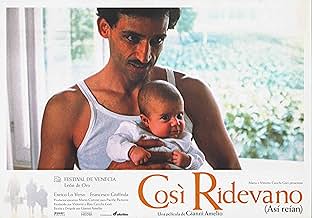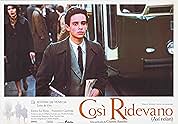Turin at the end of the fifties: two brothers have emigrated there from Sicily and the older works very hard to let the younger study and free himself from poverty through culture. The boy h... Read allTurin at the end of the fifties: two brothers have emigrated there from Sicily and the older works very hard to let the younger study and free himself from poverty through culture. The boy however is not keen on school and would like to begin to work. When after some time he gets... Read allTurin at the end of the fifties: two brothers have emigrated there from Sicily and the older works very hard to let the younger study and free himself from poverty through culture. The boy however is not keen on school and would like to begin to work. When after some time he gets his degree however things take a violent and dramatic turn......
- Director
- Writers
- Stars
- Awards
- 9 wins & 14 nominations total
- Director
- Writers
- All cast & crew
- Production, box office & more at IMDbPro
Featured reviews
The Way We Laughed is loaded with exciting Italian locales, flirts briefly with political movements, but the focus is always on what's going to happen to the relationship of these very different men. In no way a cheerer-upper, and not exciting in any conventional way, the performances are superb and the narrative compellingly mysterious if the viewer has the patience for scenes that attempt to accurately capture the process of decision making, to the way relationships often work.
The title, referring to an old joke column, is ironic. The film's review of Italian post-war economic miracle years is deeply tinged with sadness and a sense of the price paid in innocence lost to gain security and status. The whole focus is on the love between two Sicilian brothers, Giovanni and Pietro. The angel-faced Pietro (Francesco Giuffrida) from the first appears devious. When his brother arrives at the station, he slinks off and hides from him. He's lazy, a dandy, a liar, a faker, a bad seed. Yet he's worshiped by the innocent, muscular, illiterate Giovanni (Enrico Lo Verso), who has turned up with other southern immigrants at the Turin railway station intending just to visit his baby brother as the film opens and then stays on in the North to support him.
The mise-en-scène is visually beautiful but conventionalizes the period into a kind of grimy poetry more worthy of twenty or thirty years earlier, no doubt consciously echoing Italian neorealist films (Amelio has been called the new De Sica) or becoming a glossier color version of Visconti's mournful epic tragedy of southern Italians in Milan, "Rocco and His Brothers" (1960). My DVD's Italian jacket copy translates a paragraph from Stephen Holden's 2001 NYTimes review expanding one of its key ideas: "'Così rideveno'has the power to keep its own secrets," this Italian version reads. "Without ever being moralistic, by the end it becomes the metaphor for a whole society that makes a kind of tacit pact with itself never to look too deeply into the hidden effects social processes have on individuals and their destinies." The interest -- and yet the frustration -- of the film is that its sequences each appear revelatory, but shed little light on the intervening periods of time. It is organized in a "rather elegant" manner (Rosenbaum) into a structure of microscopic views of single days out of each year from 1959 through 1964, each day designated by a key word: "arrivals," "deceptions," "money", "letters, "blood," and "families." This neat structure masks a surrounding mystery in the relationship between the two brothers, and we deduce for ourselves from the way they seek out and avoid each other how alike and interdependent they are. Each cherishes illusions about the other; one is proud, the other ashamed. Vivid and touching as the film is, it's also highly artificial, notably in how little of the two characters' lives is made clear, how little the world outside their relationship is explored.
Metaphorical indeed, "Così ridevano" explores an inseparable (and ultimately false) dichotomy between innocence and experience, naiveté and sophistication that may go to the heart not only of North-South relations but of the Italian soul. Both actors, Amelio regular Lo Verso and newcomer Giuffreda, are remarkable, and the scenes between them are heartbreaking.
So far the only other Amelio film I've seen is "The Housekeys" ("Le chiavi di casa," 2004), which being a documentary-like chronicle of a short stretch of contemporary time, seems so different, and yet on reflection is so similar in feeling. Obviously Amelio is an extraordinary director and I must see "Lamarica" and "Stolen Children" ("Il ladro di bambini"), both also starring the intense, soulful Lo Verso, which have received the highest praise of any of Amelio's films.
The non-linear structure...set on six separate days, from 1958 to 1964...is completely in keeping with the curvilinear unfolding of the events and emotional reactions throughout this splendid film.
It's powerful ending achieves the exact right tone. I only wish that awful music that accompanies the closing credits didn't nearly jar my sensibilities out of the rich rewards of the movie.
Captioned the chapters by years and key words, the film infallibly circles around the two brothers, about their incompatible interrelation, which can be approximately summed up as follows, Giovanni unyieldingly insists that Pietro should finish his study and become a teacher, to fulfil a dream he is unable to pursue, as if this means the whole world to him, while Pietro, under such pressure to excel in the class, has to live in the fear that he might fail to live up to his dear brother's expectation, which establishes a deep discord between them. Life rarely goes according to one's wishful blueprint, however Amelio's meticulous endeavour, sometimes perilously close to mushy and over-indulgent, is to testify that blood is thicker than water, no matter what, even you have to murder a person, there is a silver lining awaits you.
Attentively restoring a retro setting of a period ripe with absolute poverty and blatant opportunism, Amelio opts for an alternative to green-light the success of the uneducated- but-determined money-grabber other than the younger-but-intellectual generation, eventually it is the latter's voluntary sacrifice saves the former from going down to the prison, so that the former can secure his hectoring business and start a genuine Italian family, with a sincere guilt compelling him to make up for the latter, but in the coda, after a heavy-handed device to sabotage a formal farewell ceremony, it leaves us wonder, how the two brothers have changed internally during the time-span, the same four-elephants-in-a- fiat joke caps the film, yet, they have become more distant from each other both physically and mentally.
Enrico Lo Verso, the leading actor of Amelio's more well-received works (THE STOLEN CHILDREN 1992 and LAMERICA 1994), greatly elicits Giovanni's devoted affection towards his beloved brother, addresses the most cringe-worthy dialogue (in Sicilian dialect, sounds like an utterly different language from Italian) with unaffected candour. Giuffrida, the young actor, was only 17 during the filming, is a few notches below by comparison, his Pietro is less sympathetic and his emotional spectrum is more intangible to pin down.
Many a time, the chapter-to-chapter cohesion fails to be fluent, viewers are prone to feel disconnected and confused about the happenings, for example, Giovanni's intentional tantrum in Pietro's school is introduced abruptly since Amelio coyly refuses to lay bare what has happened to Pietro, similarly, from his disappearance to a miraculous triumph aided by a private teacher, Pietro's transformation is bluntly conjured up without any weight. For what it's worth, THE WAY WE LAUGHED feels a tad undeserving of its garland, nostalgic, mawkish and a run-of-the-mill drama falls flat on its face.
Did you know
- TriviaThe title refers to the back page of a popular 1950s Italian magazine which had a section devoted to old jokes that were no longer funny but still evoked a sense of nostalgia. One such joke is repeated throughout the film: "How do you get four elephants in a Fiat?" The answer: "Two in front and two in back".
- ConnectionsReferenced in Cannes Paradise (1999)
- SoundtracksCucara cha cha cha
Written by Tony Vargas and Pepe Villa
Performed by Dámaso Pérez Prado
Courtesy of Peer International Corp./Edizioni Peersongs Italy Srl
Details
Box office
- Gross US & Canada
- $57,009
- Gross worldwide
- $57,009





















